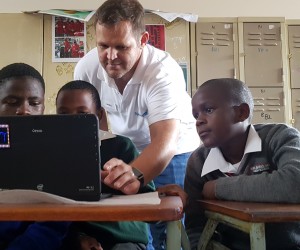Datatec-funded Saturday and holiday school programme a catalyst for upholding 98% minimum matric pass rate among vulnerable high-school learners.
Sixty Gauteng Grade 8 and Grade 10 learners, the majority of them orphaned and vulnerable, were 2019 participants in the Tomorrow Trust’s Saturday and holiday school programme which took place this year, and was funded by Datatec Group’s education and technology foundation. The high-school learners benefited from a holistic daily programme including self-mastery workshops, career guidance, digital literacy, motivational talks and leadership development.
The Tomorrow Trust is a non-profit organisation that supports orphaned and vulnerable children throughout their educational journey, focusing on academics and life skills.
“Results released by the Trends in International Mathematics and Science Study [TIMSS] show that at Grade 9 the national average score for South Africa is 372 points for mathematics – 38th out of 39 countries – and 358 points for science, which puts us in last position,” says James Donald, CEO of the Tomorrow Trust. “To compound these frightening statistics, 47% of learners in South Africa drop out of school at the end of Grade 9.”
By contrast, all of the Grade 9 learners on the Tomorrow Trust programme in 2019 chose maths as a subject for Grade 10; and its Saturday and holiday school programme has a 98% retention of Grade 8 learners moving to Grade 9, while Grade 9 moving to Grade 10 retention is 96%. The group averages this year in maths and English for Grade 9 learners on the programme, compared with those not involved, were 68% versus 31% in maths, and 60% versus 55% in English.
Donald explains that the Saturday and holiday schools programme isn’t intended for top-performing individuals. “Rather, it’s aimed at those who are performing at averages of 40% or less, with a focus on helping them become top performing.”
The Tomorrow Trust also runs the Shift initiative, which equips learners to meet some of the challenges specifically associated with the 4th Industrial Revolution (4IR), including digitised tuition in digital literacy, coding, gaming and robotics. The Datatec Foundation funded a key component of the new Shift programme this year – the rollout of the Grade 10 online Siyavula Mathmematics Classroom Programme says Donald, “The programmes are thus perfectly aligned with Datatec’s business, as they include ICT [information and communications technology] as a cutting-edge educational tool, giving learners a head start on 4IR thinking by equipping them with soft skills in problem-solving, creativity and critical thinking.”
The success of the Saturday and holiday school programme is evident among Grade 10-12 learners too. Over the last eight years, the programme has assisted 602 learners to complete their National Senior Certificate. The overall pass rate has been 98%, with 78% of learners achieving a Bachelor Pass Rate. Last year, Tomorrow Trust learners’ university pass rate, compared to the National Department of Education’s university pass rate, was 72% versus 37%, following 2017’s 86% versus 29%. In 2018 Tomorrow Trust’s Grade 12 learners achieved 76 distinctions (80% and above), and the group average moved from 50% in 2015 when they joined the programme to 73% on completion.
Among these impressive group results there are standout individuals. Pretty Madiya, a learner from Tembisa who joined the Tomorrow Trust in Grade 8, started with averages of 63% in English and 51% in maths; by the end of Grade 12, her English had improved to 75% and maths to 66%, paving the way for her to follow her dream to study at the University of the Western Cape (UWC), doing a BSc in Medical Biosciences. Lebohang Basil Mofokeng, also from Tembisa, showed remarkable improvement, moving from 54% in English at the start of the programme while he was in Grade 10 to 67%, and he improved his maths mark from 49% to 77%; Lebohang is now studying medicine at the Sefako Makgatho Health Sciences University. Nomfundo Mazibuko from Soweto started with 46% in English and 57% in maths while in Grade 8, moving up to 61% in English and 83% in maths; she is now studying biochemistry at the University of the Witwatersrand.
The Tomorrow Trust runs several other holistic education programmes throughout the year at various host-partner venues, including a junior holiday school programme aimed at Grades R-7, a tertiary programme and an alumni programme. Juniors are given tuition in English, literacy and numeracy, as well as fun workshops for self-growth and understanding. Meals, transport and stationery are provided. In the tertiary programme, students are offered full university bursaries, plus psychosocial and academic support through monthly workshops that cover life skills, study skills, self-awareness and self-mastery. These students are required to give back at least 10 hours a year to the younger groups, becoming motivators and role models to them. Alumni are encouraged to give back too, providing mentorship to younger-grade students.
Group marketing and communications manager for Datatec, Wilna de Villiers says, “What’s heart-warming for us is how the learners are blossoming with the extra support. We love Tomorrow Trust’s holistic approach, we see how learners’ academic performance dramatically improves as a result of them feeling supported, encouraged and understood. Learners on the programme are the most vulnerable in society and yet they make the most of the opportunities given to them.”







